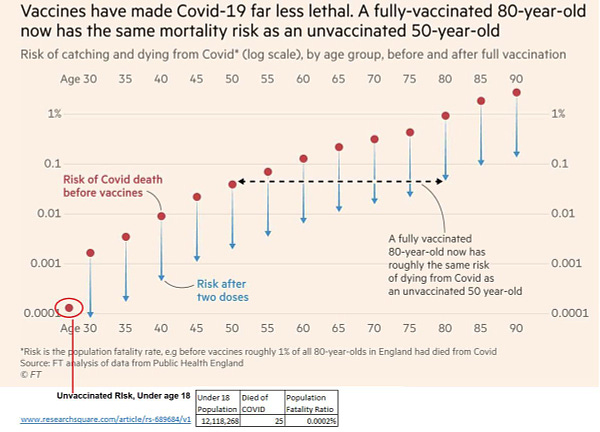Links For September
[Remember, I haven’t independently verified each link. On average, commenters will end up spotting evidence that around two or three of the links in each links post are wrong or misleading. I correct these as I see them, and will highlight important corrections later, but I can’t guarantee I will have caught them all by the time you read this.]
1 : My parents’ and grandparents’ generations had lots of weird rules about fashion like “never wear white after Labor Day”. I’d always been baffled by this kind of stuff - why not? What would happen if you did? In 1922, someone wore a straw hat after official stop-wearing-straw-hats date September 15, leading to the week-long Straw Hat Riot in New York and several hospitalizations.
2:The Story Of Adrenochrome: QAnon believes that elites are addicted to adrenochrome, a drug synthesized from the glands of tortured children. Where did this theory come from? The short version is “Hunter S Thompson made it up for Fear and Loathing in Las Vegas”. But read the long version for, among other things, explanations for why it shows up in Dune and A Clockwork Orange.
3: While the Aztecs were sacrificing prisoners to the gods, their neighbors in the Tlaxcala were “a republic ruled by an assembly of commoners and nobles”.
4: Contra speculation, there is no link between knowledge of the Tuskegee experiment and black people’s unwillingness to take the COVID vaccine.
5: The Phoney War was the eight months at the beginning of WWII when nobody was doing large-scale fighting. Everyone had different clever puns making fun of this: the British called it the Bore War; the Germans called it the Sitzkrieg. Anyway, be careful what you wish for.
6 : Making fun of calling things paradoxes.
7: Not sure if this counts as “the left is eating itself”, but the (unofficial) Brandeis Suggested Language List now recommends students not use the term “trigger warning” because it is “violent language”.
8:ArrangedMarriages.co is a site by some trad Twitter people who offer to arrange a marriage for you. They claim to have already completed one pairing. I cannot get any more information about how they work, let me know if you have some.
9 : Noah Veldtman’s AI-Generated Movie Posters. “Each of these images was generated by AI based on a brief text description of a movie. Can you guess the movie from the image?”
10: A while ago I linked Glenn Greenwald’s claim that (contra most media sources), the bungled clearing of Lafayette Park in Washington DC wasn’t President Trump’s fault. Many commenters argued that it was, or at least that Greenwald’s argument was overly simplistic. I was finally able to find a good article making the anti-Trump case in full, which I link here in penance: Trump’s False Lafayette Square Exoneration. At this point I’m at the “sounds really complicated, don’t care enough to sort this one out” phase.
11:
 Laocoon of Troy @LaocoonofTroyEducating children: this is the way.
Laocoon of Troy @LaocoonofTroyEducating children: this is the way.
[12:16 PM ∙ Aug 26, 2021
45,626Likes8,118Retweets](https://twitter.com/i/status/1430866692964589573)
12: Bobobob of DSL reviews War Against The Weak , a book on early 20th century American eugenics. I had always imagined this as a carefully-planned conspiracy by sinister eggheads, but the book argues that even by its own standards it was a total train wreck. Eugenicists launched a national campaign to sterilize blind people, even though 90%+ of blindness is non-hereditary. People who didn’t like their totally-normal-IQ family members sent them to the courts as “feebleminded”, and the courts ordered their sterilization after rubber-stamp examinations. Not sure if all of it was that bad or the book focused on the worst examples - but the worst were pretty awful.
13: H/T Marginal Revolution - During economic recessions, women (but not men) report higher rates of chronic pain. This makes sense to me in the context of women having higher rates of somaticizing negative emotions (see part 5 here for more).
14: Congratulations to Jason Crawford, whose Roots Of Progress blog is now a nonprofit organization working within Tyler Cowen, Patrick Collison, etc’s Progress Studies movement to “[establish] a new philosophy of progress for the twenty-first century”. They are fundraising and also looking for a Chief of Staff.
15: Speaking of progress, every few months I see an article saying that however good you thought SpaceX was before, it’s even better than that. Anyway, according to this article, SpaceX is even better than however good it was you thought last time you read an article about it. Lots of stuff there, but one key point is that Starlink is pretty close to becoming a completely uncensorable Internet service. Elon Musk is apparently aware:
 (source)
(source)
Plausibly SpaceX will still have to follow the rules of its host country, the US. “The whole world will depend on US internet regulatory law” would have sounded more inspiring a few years ago than it does today. But this Tumblr user gives the sci-fi ending I was looking for:
As space-based manufacturing capability is built and expanded, it is quite possible that no terrestrial presence will be required to maintain the space-based side of the ISP. Tesla has a history of releasing patents into the wild; it is not an inconceivable future in which anyone who wishes can construct a Starlink-compatible satellite terminal without approval from the local regulatory bodies. The resultant information hyperloop is uncensored, accessible to all who try, with no controls on content or expression save what the user decides to implement for themself
Where am I going with this?
Imagine a future in which Earth’s dominant ISP is constructed, maintained, administered, and governed by Martians, who operate it for free as a public-relations campaign. And Earth can’t do anything about it except try to jam the airwaves and confiscate end-user terminals, because to attack the actual satellites would begin a Kessler Syndrome that would deny space to Earth.
16:
2,482Likes760Retweets](https://twitter.com/davidzweig/status/1432711348903989251)
17: Why are published papers so bad about sharing their data? An academic on Discord (no link, sorry) proposes one potential explanation: it takes a lot of work to gather a dataset. Journals won’t publish datasets, so you can’t include them as a publication on your resume, so by default you get no credit for doing this difficult thing. The recognized workaround is to turn your hard-won dataset into lots of papers: “We Surveyed Youth Food Tastes And Found Apples Are Very Popular”, “We Surveyed Youth Food Tastes And Found Strawberry Consumption Is Highest In The Midwest”, “We Surveyed Youth Food Tastes And Found White People Are More Likely To Eat Pears”, etc. But if you publish your data with your first paper, then other researchers can beat you to Papers #2, #3, etc, and all your hard data-collection work will be unrewarded. I found this theory enlightening; this seemingly inexplicable failure is a totally normal problem of how to internalize the rewards for hard work. I wonder why there’s no Journal Of Datasets. [EDIT: There is, Scientific Data , but commenters say that informal “what gets you respect” is more important than formal “what gets you citations”]
18: Devon Zuegel actually physically visits the charter city of Prospera and writes a very long FAQ about what she learned.
19: D’Alonzo and Tegmark try to use AI to evaluate media bias. They create a giant corpus of articles from different sources, then look for words or phrases with high predictive power for which source a given article comes from. For example, the algorithm might find that some sources always use “abortion rights” but never “pro life” or vice versa, and so using one or the other of these phrases is useful for determining an article’s source. Once it has a bunch of pairs like these, it does a principal components analysis (I can’t tell whether “two components” naturally fell out of the data, or they decided it by fiat), and are mostly able to recreate a standard political compass with dimensions of “right vs. left” and “pro vs. anti-establishment”, as well as plot where different phrases and sources fall on the compass. The actual paper has lots of goodies, and I might blog about it more later, but for now, the headline result is:
This picture has some glaring flaws, but the authors at least provide us with some hilarious explanations. For example, right-wingers overuse the word “socialist” so much (eg “Obama wants socialist health care!”, “The Democrats are trying to smuggle socialism in through the back door!”) that the AI interprets use of the word as a cue for conservatism, and so misclassifies Jacobin (a socialist magazine) as right-wing. Still, neat idea.
By the way, this is the same Tegmark who in 1998 developed a leading theory for what the universe is and why it exists at all. I feel like going from “discover fundamental nature of the universe” to “attempt to investigate media bias, but it has glaring flaws” is a slightly-too-on-the-nose metaphor for the past 25 years of science as a whole.
20: Mea culpa: last month, I linked to a poll showing that PhDs had the most vaccine hesitancy of any group. I explicitly considered the possibility that the poll had been skewed by malicious responders, but based on the time course I said it seemed unlikely. Now someone with access to the raw data has investigated that question, and it was definitely skewed by malicious responders. There is no evidence that PhDs are any more vaccine-resistant than the general population, and the smart bet would be that they’re less.
21: More mea culpa: last month, I linked to some articles speculating on why, even though Haiti and the Dominican Republic had the same GDP in 1960, the Dominican Republic eventually did much better. Now a Haiti econ blog (appropriately named Vodou Economics) proposes a much better explanation - the data are wrong, and the DR was always ahead of Haiti. The DR’s recent economic boom is still interesting, but we should stop insisting on finding a post-1960 explanation for Haiti’s current woes.
22: Twitter increasing max tweet length from 140 to 280 characters had little effect on average tweet length.
23: The Heckman Curve is the claim that you can get bigger effects by targeting interventions at young children compared to adults - eg money spent on preschool goes further than money spent on vocational training. Here’s a old but good Andrew Gelman post on the controversy around it.
24: We now have okay biomarkers for aging. What happens when we test them on hunter-gatherers? Answer: the Tsimane, a hunter-gatherer tribe who have low rates of chronic age-related disease compared to Westerners, don’t seem to be aging much slower. Whatever is giving us so many chronic diseases can’t really be described as “accelerated aging”, at least not in whatever sense these biomarkers test.
25: Researchers gave students a dataset about exercise and BMI, and asked them to analyze it. In one condition, the students were told what hypotheses to investigate; in the other, they weren’t. Then the researchers checked which students noticed that the “dataset”, when plotted, looked like this:
 This was a self-conscious riff on the psych experiment about the students watching the video of the sports game with the gorilla.
This was a self-conscious riff on the psych experiment about the students watching the video of the sports game with the gorilla.
Students trying to prove the hypothesis were less than half as likely to notice the gorilla than those investigating aimlessly. I’m agnostic as to whether this proves something important about science or is just funny.
26: People have commented before on how Rage Comic Guys/Wojaks/4chan/Reddit/PCM are creating a new symbolic online language, but I didn’t appreciate it fully until I read this Greek mythology 6x6 Wojak compass mapping the new archetypes on to the old. Warning: very high-context.
27: Why is commercial real estate so often vacant during recessions? Even if there’s really low demand, wouldn’t landlords still prefer to lower the price until someone accepts, and make a little money rather than none? This Reddit explainer says no, because of quirks of how banking works.
28:MHC compatibility among couples does not seem to differ from chance. That is, some people previously claimed that we preferentially fell in love and mated with people whose immune systems were especially compatible with ours, maybe because we could smell this in their body odor. This study says that’s probably not true.
29: Study shows Donald Trump is grumpy when he does not get enough sleep. Being an important enough figure that scientists study you personally sounds exhausting.
30: A Voxsplainer about the potential promise of geothermal energy.
31: A Voxsplainer in spirit (actually on Works In Progress) by Stephan Guyenet on new weight loss drug semaglutide. Although it is excellent, I find it raises more questions than it answers. The drug was originally designed to increase insulin secretion, but apparently its weight-loss-related effects are completely separate from that and involve some action in the hypothalamus? And it decreases alcoholism and generally improves impulse control? I’m really curious what lever it’s pressing here and I hope that - despite already being one of the biggest science stories of the decade - it eventually leads to even more mental health applications.
32: Mina, the tent city of Mecca:
33 : Related:Poniente Almeriense, the greenhouse plain of Spain:
34: It’s generally-believed that IQ is mostly-environmental early on in life, but mostly-genetic after adulthood. Lots of adoption studies show that adoption makes a big difference early on, but what about later? In the latest study, 415 adoptees had their IQs tested during adulthood. IQ of biological parents explained about 42% of variance; IQ of adoptive parents explained only 1%. “Variance explained” is a non-intuitive statistic with a lot of confusing properties - but in this case the obvious conclusion that genetics matter vastly more than environment and environment more-or-less doesn’t matter at all is basically right. Critics note that there isn’t much range in adoptive families, either in intelligence (you don’t get too many very low-IQ parents adopting) or in environment (adoption agencies successfully screen out atrocious environments), so the real numbers might be higher. I would have more to say about this if I could access the supplemental data. Still, I think this is really strong evidence (in case you needed more) that environment has practically no effect on adult IQ in the normal range. Ethnicity was mostly white and Asian, and IQ didn’t vary enough by ethnicity to do anything with it, so no direct implications for learning anything about race. But the indirect implication of “within a racial group, environment has so little effect on IQ that even being adopted leaves it practically unchanged” is that cross-race differences can’t be due to anything that’s likely to vary within (this group of) white families, eg families speaking different number of words to their children or whatever.
35:Problems with using East vs. West Germany as a “natural experiment” in the effect of different policies - the populations were already pretty difference, plus a (selected) 20% of the East German population fled to West Germany before they built the Berlin Wall.
36:Criticism of Henrich’s WEIRDest People In The World argument.
37: Semiconductor manufacturers have “about as much built-in voodoo and superstition as a major-league baseball team” (h/t Artir). Sometimes (according to the link) justified: “One company found its yield dips corresponded to phases of the moon: it seemed that high tides also raised groundwater levels and thereby increased the moisture in the lab.”
 David Zweig @davidzweigIf you are a vaccinated adult and living a relatively normal life, but find waiting for a pediatric vax “intolerable,” please understand that your unvaccinated child is at a significantly lower risk than you
David Zweig @davidzweigIf you are a vaccinated adult and living a relatively normal life, but find waiting for a pediatric vax “intolerable,” please understand that your unvaccinated child is at a significantly lower risk than you 


